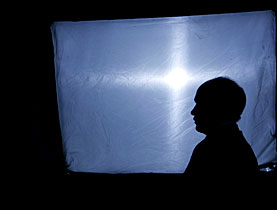
Maurer takes People’s Party back into the fold

Hardline and uncompromising, new cabinet minister Ueli Maurer has helped shape the rightwing Swiss People's Party into Switzerland's largest political force.
But Maurer says he is willing to collaborate with his colleagues in the seven-member, multiparty government, where consensus and providing a united front is key.
Maurer was elected by parliament on Wednesday, in what marks a return to cabinet for the People’s Party after one year of self declared opposition. This was despite the fact that Maurer had declared several times in the past that he was not interested in the post.
“What counts is the decision of the party. If they want to return to government, I am ready to take on the task,” Maurer told a newspaper before his election.
This year has been one of great change for the Zurich politician. In March he gave up the party presidency to concentrate on his work as a parliamentarian and communications consultant.
A few months later, however, he was back at the helm of the party’s Zurich branch, the party’s hardline core and guiding force.
According to those who know him, Maurer, who trained in business and accountancy, is a hard worker and completely devoted to his cause.
During his time as president, the party increased its share of the electorate from 14.9 per cent in 1996 to 29 per cent in 2007.
He mobilised support in non-stronghold areas and sought to build a strong basis around party leading light and former Justice Minister Christoph Blocher.
In all, 12 new cantonal parties and 600 local chapters were founded under Maurer’s reign.
Black sheep
Despite this, Maurer has been overshadowed by the charismatic Blocher, being variously depicted as the hardliner’s servant boy or clone.
In a recent interview, Maurer explained that each man had a specific role.
Blocher was the strategist in charge of deciding which political topics were important. Maurer had to ensure that these gained the necessary political acceptance and also decide how best to present them to the public.
It was Maurer who opted for the infamous black sheep posters, which showed three white sheep kicking a black sheep out of Switzerland. The poster, considered by many to be “anti-foreigner”, was widely criticised in Switzerland, and attracted much negative comment abroad.
According to the president of the centre-right Christian Democratic Party, Christophe Darbellay, there are two Ueli Maurers.
“There’s the pragmatic, intelligent and nice person to whom you can talk, and then there’s the other Maurer – hard, dogmatic and who only cares about his own party’s interests.
“Only one of them is compatible with a government office,” said Darbellay.
Maurer has often shown his tough side towards his party colleagues if he feels they are not up to scratch.

More
Swiss People’s Party
Snub
After Blocher was replaced in cabinet by Justice Minister Eveline Widmer-Schlumpf, Maurer snubbed both her and former Defence Minister Samuel Schmid – whose cabinet place he takes – for party disloyalty.
Widmer-Schlumpf and Schmid subsequently joined a new breakaway party called the Conservative Democrats. This left the People’s Party with no representative in government.
However, before his election Maurer was at pains to say that he would work for the benefit of the country, even if this meant going against the party line.
“Collegiality is not a problem, it’s part of the political system,” Maurer said. “I am prepared to work in a constructive way with Eveline Widmer-Schlumpf and to defend the army’s work abroad and the free movement of people.”
A farmer’s son, who is married and has six children, Maurer defines himself as a patriot. Holidays are always spent in Switzerland, Heidi is one of his favourite books and he enjoys listening to the Swiss National Anthem.
The new minister rejects accusations that he is racist. “There’s no room in our party for extremists. My wife was born and raised in Ghana, we have many black friends and we eat more couscous at home than we do [the typical Swiss dish] raclette,” he said.
Political considerations are never far away. “If you don’t use strong words you won’t get any attention,” Maurer has said.
“If you talk about crime being on the rise, the journalists all disappear. If, on the other hand, you talk about crime by foreigners being on the rise, suddenly they’re all listening.”
swissinfo, based on an article in Italian by Andrea Clementi
Ueli Maurer was born on December 1, 1950 in Wetzikon near Zurich. He trained in commerce and accountancy. In 1994 he became head of the Zurich farmers’ association.
He started his political career in 1978 in local politics in the village of Hinwil in canton Zurich. He was elected to the cantonal parliament five years later.
In 1991 he moved up to national politics becoming a parliamentarian in the House of Representatives.
He has suffered some political setbacks: in 1991 he failed to be elected to the Zurich local government, beaten by the current Environment Minister Moritz Leuenberger.
In 2007 he was not elected to the Senate.
In 2008 Maurer gave up the party presidency in favour of heading the Zurich faction.

In compliance with the JTI standards
More: SWI swissinfo.ch certified by the Journalism Trust Initiative


























You can find an overview of ongoing debates with our journalists here . Please join us!
If you want to start a conversation about a topic raised in this article or want to report factual errors, email us at english@swissinfo.ch.